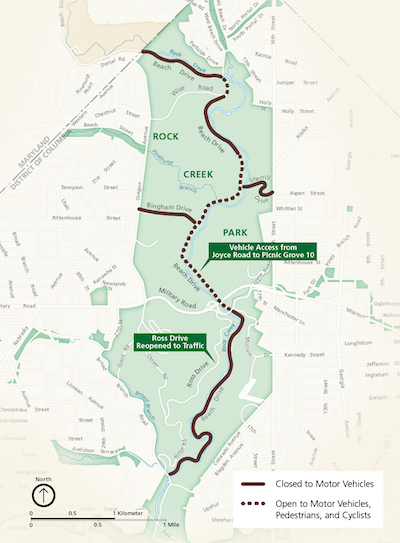
Map of road closures in the upper section of Beach Drive in Rock Creek Park.
A decision to keep the upper section of Beach Drive through Rock Creek Park in Washington, D.C., closed to vehicles seasonally has been changed to keep traffic off the scenic drive year-round, the National Park Service has announced.
This decision will allow visitors to enjoy the park’s recreation and nature opportunities 365 days a year, the agency said. A full-time closure of this section of Beach Drive will provide safer park experiences year-round by reducing conflicts between people who walk, bicycle and drive, a Park Service release said. It also expands access for visitors with disabilities to areas of the park that lack separated pathways and accessible trails.
"Opening this section of Beach Drive to pedestrians and cyclists has provided our community with increased opportunities for healthy recreation, greater access to nature and outdoor enjoyment," said Rock Creek Superintendent Julia Washburn. "We hope to continue seeing you all on Beach Drive and ask for your help as we work to protect sensitive habitat surrounding the road."
In selecting the year-round closure over the previously proposed seasonal closure, the Park Service said it recognized that the closure allowed outdoor recreation in the park to flourish and provided "enormous mental and physical health benefits to those who have used the upper portion of Beach Drive for recreation since its initial closure in April 2020."
The upper portion of Beach Drive is a minor road that carries a small amount of traffic relative to nearby roadways. Traffic studies concluded that a full closure to motorized vehicles would result in minimal impact to traffic during peak commute times, the Park Service said.
The year-round closure does have the potential to have negative impacts on park resources, particularly wildlife, rare, threatened and endangered species, and their habitats, the agency acknowledged. During the closure of the upper portion of Beach Drive, park staff has seen an increase in visitors cutting through the forest (often to get to or from the road) and damaging plants and sensitive wildlife habitat. The Park Service plans to mitigate these impacts by developing a visitor use plan, which will include monitoring and active management of unofficial trails, and implementing the US Fish and Wildlife Service’s Recovery Plan for the Hay’s Spring amphipod. The public can help us protect sensitive resources by staying on designated trails (look for trail blazing) in Rock Creek Park and keeping dogs on leash.
Closure details
Approximately 5 miles of roadway will remain open to only pedestrians and cyclists, including Bingham Drive, Sherrill Drive, and Beach Drive in three sections:
From Broad Branch Road to Joyce Road,
From Picnic Area 10 to Wise Road, and
From West Beach Drive to the DC/Maryland line.
Between Joyce Road and picnic areas 6-10, Beach Drive will remain open to motorized vehicles only to access group picnic areas and parking lots. Ross Drive will reopen to motorized vehicles.



Comments
"In selecting the year-round closure over the previously proposed seasonal closure,..."
This is nothing short of outrageous. The NPS is now going to start closing park roads for the benefit of the few so as to "reduce conflicts"? What government speak. Where will this end? Too many collisions with wildlife and the NPS will permanently close a road to "reduce conflicts"?
This is to say nothing about the continued NPS attack on the elderly.
Not good with the internet old lady? No entrance permit for you!
Too old or disabled to walk or cycle old man? Park is closed off to you!
But hey, that's one less road park management has to patrol and maintain. What a disgrace.
Yes, there was a public comment period over the summer.
In July 2022, the NPS published the Environmental Assessment (EA) for public comment and shared three alternatives for consideration: Alternative 1: No-Action Alternative Pre-Covid-19 Pandemic Management; Alternative 2: Full-Time Closure for Recreation; and Alternative 3: Seasonal Closure for Recreation, the preferred alternative at the time of the EA publication. Based on the analysis presented in the EA, extensive public input and NPS internal deliberation and analysis, the NPS has selected Alternative 2 for implementation.
You can find the EA here: https://parkplanning.nps.gov/projectHome.cfm?projectID=102800
While the map is accurate, the headline isn't. The Park is continuing its policy of closing segments of Beach Drive; these segments have been closed on weekends and holidays for years and on weekdays since 2020. All picnic areas are accessible by car.